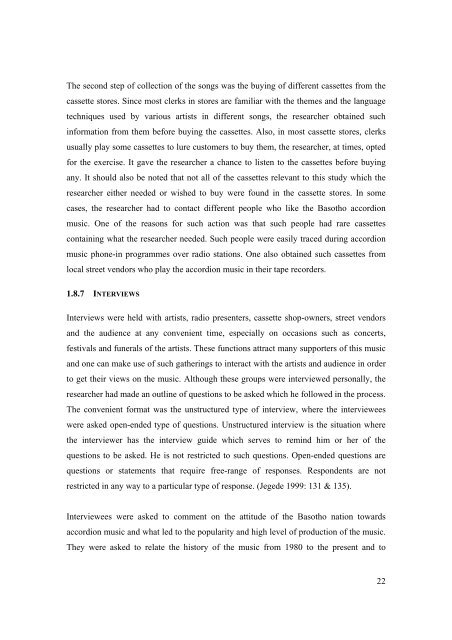Analysis of the language techniques and thematic - University of the ...
Analysis of the language techniques and thematic - University of the ...
Analysis of the language techniques and thematic - University of the ...
You also want an ePaper? Increase the reach of your titles
YUMPU automatically turns print PDFs into web optimized ePapers that Google loves.
The second step <strong>of</strong> collection <strong>of</strong> <strong>the</strong> songs was <strong>the</strong> buying <strong>of</strong> different cassettes from <strong>the</strong><br />
cassette stores. Since most clerks in stores are familiar with <strong>the</strong> <strong>the</strong>mes <strong>and</strong> <strong>the</strong> <strong>language</strong><br />
<strong>techniques</strong> used by various artists in different songs, <strong>the</strong> researcher obtained such<br />
information from <strong>the</strong>m before buying <strong>the</strong> cassettes. Also, in most cassette stores, clerks<br />
usually play some cassettes to lure customers to buy <strong>the</strong>m, <strong>the</strong> researcher, at times, opted<br />
for <strong>the</strong> exercise. It gave <strong>the</strong> researcher a chance to listen to <strong>the</strong> cassettes before buying<br />
any. It should also be noted that not all <strong>of</strong> <strong>the</strong> cassettes relevant to this study which <strong>the</strong><br />
researcher ei<strong>the</strong>r needed or wished to buy were found in <strong>the</strong> cassette stores. In some<br />
cases, <strong>the</strong> researcher had to contact different people who like <strong>the</strong> Basotho accordion<br />
music. One <strong>of</strong> <strong>the</strong> reasons for such action was that such people had rare cassettes<br />
containing what <strong>the</strong> researcher needed. Such people were easily traced during accordion<br />
music phone-in programmes over radio stations. One also obtained such cassettes from<br />
local street vendors who play <strong>the</strong> accordion music in <strong>the</strong>ir tape recorders.<br />
1.8.7 INTERVIEWS<br />
Interviews were held with artists, radio presenters, cassette shop-owners, street vendors<br />
<strong>and</strong> <strong>the</strong> audience at any convenient time, especially on occasions such as concerts,<br />
festivals <strong>and</strong> funerals <strong>of</strong> <strong>the</strong> artists. These functions attract many supporters <strong>of</strong> this music<br />
<strong>and</strong> one can make use <strong>of</strong> such ga<strong>the</strong>rings to interact with <strong>the</strong> artists <strong>and</strong> audience in order<br />
to get <strong>the</strong>ir views on <strong>the</strong> music. Although <strong>the</strong>se groups were interviewed personally, <strong>the</strong><br />
researcher had made an outline <strong>of</strong> questions to be asked which he followed in <strong>the</strong> process.<br />
The convenient format was <strong>the</strong> unstructured type <strong>of</strong> interview, where <strong>the</strong> interviewees<br />
were asked open-ended type <strong>of</strong> questions. Unstructured interview is <strong>the</strong> situation where<br />
<strong>the</strong> interviewer has <strong>the</strong> interview guide which serves to remind him or her <strong>of</strong> <strong>the</strong><br />
questions to be asked. He is not restricted to such questions. Open-ended questions are<br />
questions or statements that require free-range <strong>of</strong> responses. Respondents are not<br />
restricted in any way to a particular type <strong>of</strong> response. (Jegede 1999: 131 & 135).<br />
Interviewees were asked to comment on <strong>the</strong> attitude <strong>of</strong> <strong>the</strong> Basotho nation towards<br />
accordion music <strong>and</strong> what led to <strong>the</strong> popularity <strong>and</strong> high level <strong>of</strong> production <strong>of</strong> <strong>the</strong> music.<br />
They were asked to relate <strong>the</strong> history <strong>of</strong> <strong>the</strong> music from 1980 to <strong>the</strong> present <strong>and</strong> to<br />
22

















